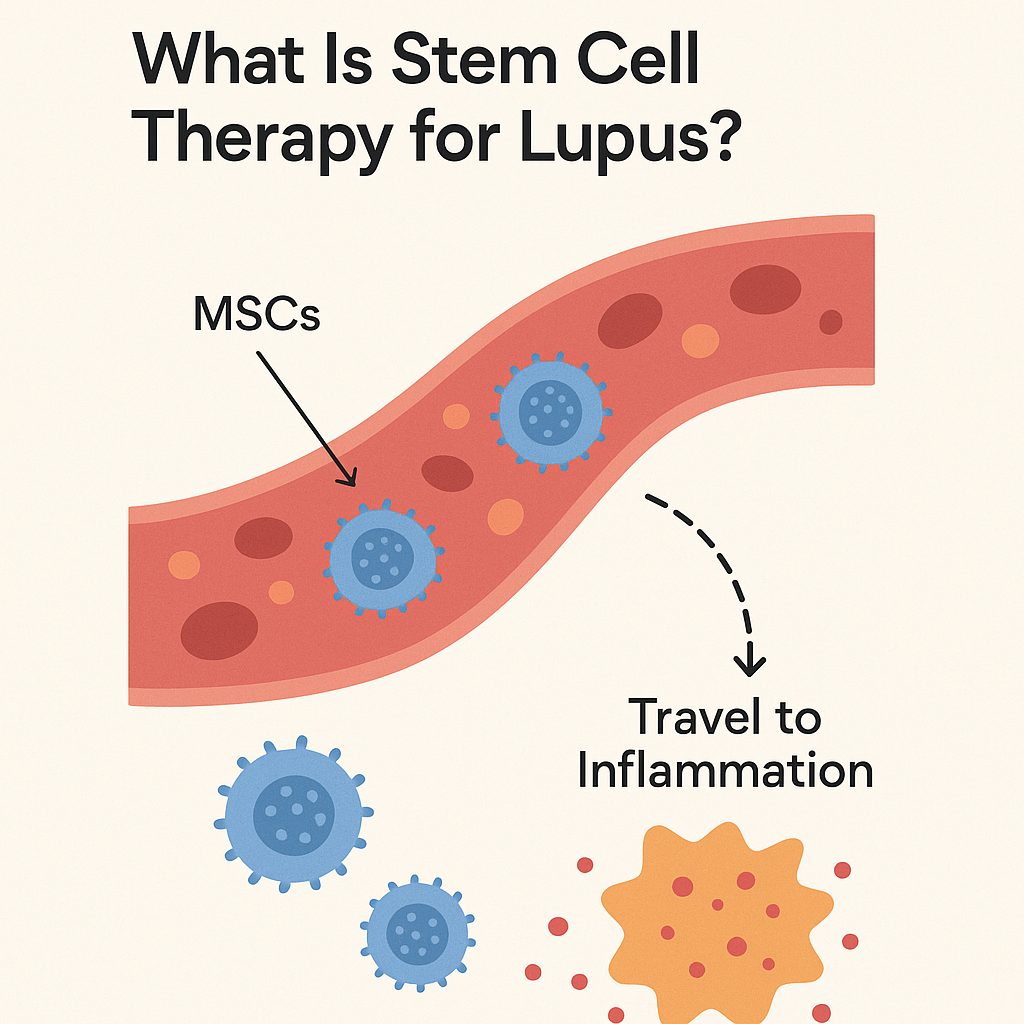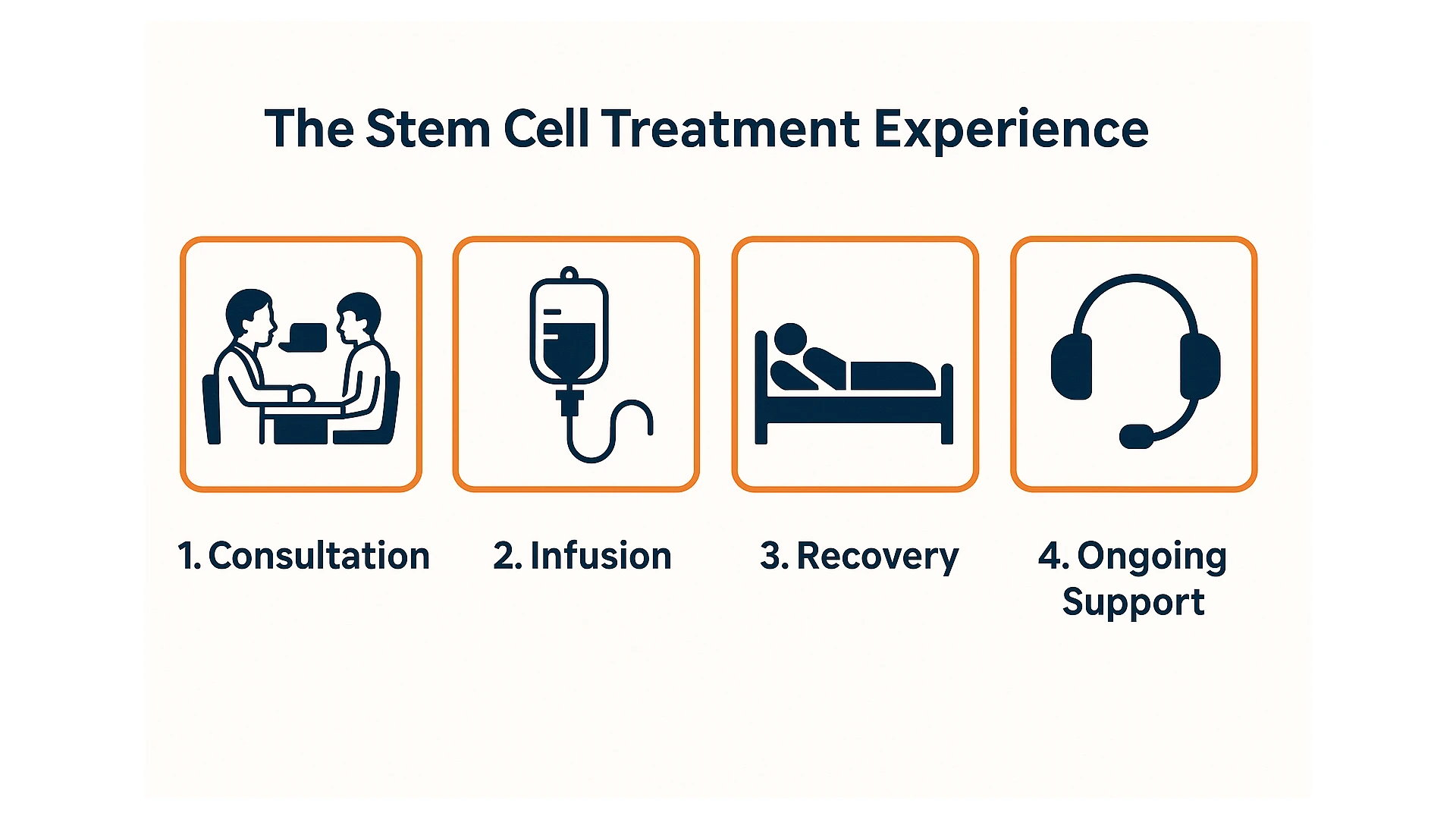Autoimmune
Stem Cell Treatment
Finding Relief from Lupus: Understanding Stem Cell Therapy for Autoimmune Balance
When lupus occurs, your immune system attacks your own tissues and organs mistakenly, causing widespread inflammation and damage. If unpredictable flare-ups have been disrupting your daily life, you might consider exploring stem cell therapy as a treatment option that addresses the root causes of this complex autoimmune disease.
Unlike traditional therapies that mainly address symptoms, stem cell therapy targets the underlying immune dysfunction and tissue damage. Clinical studies show that many patients receiving stem cell therapy experience meaningful improvements in disease activity and quality of life, with research reporting significant reductions in flare frequency and severity.
In this comprehensive guide, we'll explore how stem cell treatment works at the cellular level to help restore natural immune balance, what you can expect during the process, and whether this regenerative approach could support your journey toward better health.
What Is Stem Cell Therapy for Lupus?
Stem cell therapy for lupus represents one of the recently introduced treatments offering a new method of addressing this autoimmune disease. This approach leverages your body's own repair mechanisms by utilizing stem cells that have remarkable abilities to help regulate immune function.
Mesenchymal stem cells (MSCs) are particularly effective in the context of lupus because they can:
- Generate a variety of cell types that aid in repairing body tissues
- Modulate overactive immune responses throughout the body
- Reduce inflammation caused by lupus
- Support tissue repair and healing processes
The procedure typically involves the intravenous administration of these cells, which then travel to inflamed or damaged tissues throughout your body. Once there, they exert their therapeutic effects by modulating the immune response and promoting healing. This comprehensive treatment option can significantly improve quality of life for many patients.

Understanding Your Body's Autoimmune Crisis
Lupus creates a situation where your immune system loses its ability to distinguish between foreign invaders and your own tissues. This confusion leads to the production of autoantibodies that attack healthy cells throughout your body, resulting in a systemic inflammatory condition that can affect virtually any organ.
Common manifestations that disrupt daily life include:
- Joint pain and swelling that limits mobility
- Extreme fatigue that doesn't improve with rest
- Skin rashes, particularly the characteristic butterfly rash
- Fever without infection
- Hair loss and sensitivity to sunlight
- Kidney problems affecting overall health
- Cognitive difficulties impacting work and relationships
These symptoms often come in waves, with periods of flare-ups followed by times of relative calm. This unpredictability makes lupus particularly challenging to live with, as your immune system wages war against your own body, creating inflammation that conventional treatments often struggle to fully control.
How Mesenchymal Stem Cells Help with Lupus
When MSCs are introduced into the body, they help ease symptoms, decrease inflammation, and potentially stop the advancement of lupus. This happens through multiple therapeutic mechanisms that work together to restore immune balance.
1. Immune System Modulation
The core problem in lupus involves an overactive immune system. MSCs interact directly with various immune cells including T cells, B cells, and dendritic cells. They regulate these cells by modulating their activity rather than suppressing them entirely. Research demonstrates that stem cells produce over 200 different supportive proteins that help regulate immune function, creating a more balanced immune response.
2. Promoting Regulatory Cell Development
MSCs have the ability to inhibit proliferation of harmful T cells while simultaneously promoting regulatory T cells. These regulatory cells play a critical role in limiting autoimmunity by acting as peacekeepers in your immune system. By increasing the number of these beneficial cells, stem cells help prevent your immune system from attacking healthy tissues.
3. Reducing Autoantibody Production
In lupus, your body produces autoantibodies that attack your own healthy tissues. Studies have shown that MSCs can decrease production of these harmful autoantibodies. Fewer autoantibodies means less damage to your organs and tissues, potentially leading to reduced symptoms and fewer flares.
4. Anti-Inflammatory Effects
Chronic inflammation is a hallmark of lupus, causing pain, swelling, and tissue damage. MSCs release anti-inflammatory cytokines that reduce inflammation throughout the body. This is essential for controlling lupus symptoms, which often manifest as inflammation in joints, skin, and organs.
5. Tissue Repair and Regeneration
Lupus can damage various organs including kidneys, heart, lungs, and skin. MSCs aid in repairing damaged tissues by differentiating into various cell types or by releasing growth factors that promote healing. This regenerative capacity is particularly valuable in lupus where multiple organ systems may be affected over time.

The Stem Cell Treatment Experience
At our clinic, the entire treatment process follows a carefully designed protocol to ensure both safety and effectiveness. We use stem cells in a controlled process that adheres to strict safety guidelines throughout.
Your Treatment Journey
Initial Consultation and Assessment
- Comprehensive review of your lupus diagnosis, symptoms, and treatment history
- Discussion of realistic treatment goals and expectations
- Evaluation to confirm you're appropriate for the procedure
- Detailed explanation of the treatment process and answering all questions
Treatment Day Protocol
- The stem cell therapy is administered through intravenous infusion
- Our medical team follows stringent safety standards throughout
- The procedure is performed by experienced professionals specializing in regenerative medicine
- Most patients find the process comfortable and well-tolerated
Post-Treatment Support
- Clear instructions for optimizing your recovery
- Ongoing monitoring as your body responds to the therapy
- Regular follow-up appointments to track your progress
- Continuous availability of our medical team for questions or concerns
Comprehensive Care Approach
To maximize your treatment benefits, we provide integrated support including:
- Personalized activity and exercise recommendations
- Nutritional guidance to support immune balance
- Stress management strategies crucial for autoimmune conditions
- Coordination with your existing medical team
What to Expect During Recovery
Initial Response Phase Some patients may experience mild reactions as their immune system adjusts to the treatment. This actually indicates that the stem cells are engaging with your immune system. Our team provides detailed guidance on managing any initial responses.
Early Recovery Period Most patients resume normal activities relatively quickly while continuing their prescribed lupus medications unless otherwise advised. Many notice early improvements in energy levels and overall well-being during this phase.
Progressive Improvement Phase The immunomodulatory effects build gradually over several weeks. Patients often report progressive improvements in various symptoms as the stem cells continue their therapeutic work.
Optimal Response Period Research indicates that peak results typically occur several months after treatment as the immune system achieves better balance and tissues respond to regenerative signals. This is when many patients experience their most significant improvements.
Long-term Outcomes Benefits often continue developing and stabilizing over time. Some patients achieve substantial improvements in disease activity, potentially allowing for medication adjustments under appropriate medical supervision.

Investment in Your Health
We believe in transparency regarding the investment required for stem cell therapy. The cost varies based on individual needs and specific treatment protocols. During your consultation, we'll provide:
- A thorough evaluation of your specific situation
- Customized treatment recommendations
- Complete breakdown of associated costs
- Discussion of available payment options
Contact our clinic for a personalized consultation where we can provide detailed pricing information based on your individual treatment plan.
Is Stem Cell Therapy Right for Your Lupus?
Stem cell therapy may be most appropriate for individuals who:
- Have confirmed lupus diagnosis with ongoing symptoms despite current treatments
- Experience frequent flares that significantly disrupt daily life
- Want to address underlying immune dysfunction rather than just symptoms
- Have concerns about long-term effects of immunosuppressive medications
- Are in overall health that allows for the procedure
We encourage you to reach out to determine if this therapy aligns with your needs. Our clinic is dedicated to providing honest, clear information to help you make the best choice for your health.
Comparing Lupus Treatment Options
Current Research on Stem Cell Therapy for Lupus
Research into stem cell therapy for lupus is growing quickly, and scientists are finding more and more evidence that it could help people manage this complex disease.
One 2024 study found that mesenchymal stem cells (MSCs) can calm down the immune system by boosting “good” immune cells and reducing the harmful autoantibodies that attack the body. People in early trials and animals with lupus showed real improvements in their symptoms (study).
A newer 2025 study tested a technique called microencapsulation, which helps stem cells survive longer once they’re given to patients. This could make treatments last longer and work better overall (study).
Another 2025 study looked at research around the world and found that most clinical trials are testing stem cells for autoimmune diseases, including lupus, with very promising results. This shows growing global confidence in stem cell therapy as a real option for patients (study).
And while it’s not stem cells, a related 2025 study on CAR-T cell therapy showed that other types of advanced cell treatments can successfully remove harmful immune cells in lupus. This points to a bigger future where different kinds of cell-based therapies could be used to treat autoimmune conditions (study).
Frequently Asked Questions
Can stem cells cure lupus? Stem cells cannot "cure" lupus in the sense of completely eliminating the disease. The goal of stem cell treatment is to modulate the immune response, reduce inflammation, and promote tissue repair, thereby controlling symptoms and preventing disease progression. Many patients experience significant reductions in flare frequency and severity, allowing for better quality of life.
Can stem cells help lupus? Many patients in clinical studies report decreased lupus flare-ups, improved energy levels, and better overall function after mesenchymal stem cell treatment. The therapy can help restore function in organs affected by lupus and reduce the need for immunosuppressive medications. Results vary between individuals, so we set clear goals and monitor progress closely.
What is the success rate of stem cell therapy for lupus? While results vary, many patients experience significant benefits including decreased disease activity, improved organ function, and enhanced quality of life. Success depends on factors including disease severity, overall health, and treatment protocol. Our comprehensive approach combines stem cell therapy with personalized care plans to optimize outcomes.
Moving Forward with Hope
Living with lupus means facing daily challenges that others may not understand. The unpredictability of flares can make planning difficult, while overwhelming fatigue turns simple tasks into major obstacles. The complexity of managing multiple medications with various side effects adds another layer of difficulty to your life.
Stem cell therapy offers a different approach by working to restore your immune system's natural balance rather than just suppressing it. Many patients report not only reduced symptoms but also improved energy, better overall well-being, and the ability to engage more fully in life.
While stem cell therapy isn't a cure, emerging research suggests it may offer a path toward better disease control and improved quality of life. By addressing the underlying immune dysfunction rather than simply managing symptoms, this approach represents a different strategy in lupus management.
Our team understands the journey you're facing and is committed to providing this innovative treatment option with the highest standards of safety and care. We're here to answer your questions, address your concerns, and support you in making the best decision for your health.
Individual results may vary. No treatment outcomes are guaranteed. This information is for educational purposes only and should not replace professional medical advice. Not evaluated or approved by the FDA or COFEPRIS for lupus indications.
Treatment
- Medical consultation
- 300 million Stem Cell IV
- Super immune IV + others as need
- Full blood panel
- Recommended supplement to take.
- Recommendation on things to do to enhance wellness.
